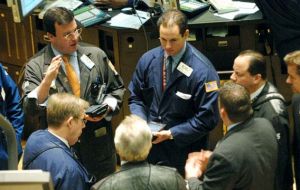MercoPress. South Atlantic News Agency
Black Thursday for markets but mixed signals from Wall Street
 No end in sight to volatility
No end in sight to volatility Global markets plunged again on Thursday with London's main FTSE 100 index seeing its sharpest fall in four-and-a-half years, but in New York Wall Street shares staged a dramatic recovery after suffering heavy losses earlier in the day.
The FTSE 100 slumped 4.1%, or 250 points, to end at 5,859, with sharp losses echoed across Europe and Asia. France's CAC-40 declined 3.3% to 5,265.47, its lowest level this year, and Germany's DAX index fell 2.4% to 7,270.07. However in New York's Dow Jones index closed down 0.12%, or 15.7 points, at 12,845.8. The benchmark Nikkei 225 index closed down nearly 2% on the Tokyo Stock Exchange after falling below the key 16,000-point mark the first time since November. South Korea's main benchmark fell 6.9%, the greatest point drop ever, to record its lowest close since May. Hong Kong's blue chip Hang Seng Index dropped 3.3% to its lowest close in two months. Markets across Latin America also suffered on investor fears of a global credit crisis but also tracked a late-session rebound as happened in Wall Street. Mexico's IPC index of leading issues ended down 1.2%, recovering from a 6% drop earlier in the day. In Brazil, the Sao Paulo Bovespa stocks index lost 2.6% but had been down nearly 9%. Argentina's Merval recovered from a 9% decline to end the day with 4.7% loss. Chile's Ipsa index finished down 4%, but also lifted off lows. Fausto Spotorno, chief economist at Orlando Ferreres y Associates in Buenos Aires, attributed the selling pressure to U.S. fund managers seeking to reduce risk exposure and also cover losses in the mortgage-backed market. "They need to finance the losses they have taken in the mortgage sector both in the U.S. and in Europe," he said. "So they are financing their losses from funds from emerging markets." Before the market opened Thursday in the U.S., troubled mortgage lender Countrywide Financial Corp. revealed it would have to draw on an 11.5 billion US dollars credit line to fund its operations, with money increasingly hard to come by in tightening credit markets. Earlier in the week, Countrywide said that mortgage delinquencies had risen in July to five-year highs. A US government report that showed construction of new homes in the US in July sliding to 10-year lows and news that investment banking giant Bear Stearns will chop 240 jobs at its sub-prime division worsened the mood. Also Thursday the US Federal Reserve injected 17 billion into the banking system in two operations. That infusion comes on the heels of a Wednesday "repo" of 7 billion, in which it buys that amount in securities from dealers, who then deposit the money into commercial banks. Central banks around the world have supplied over 400 billion US dollars in funds to banks in the past week to make cash available for lending and keep interest rates from rising amid signs that credit was drying up. (The Fed has so far injected 88 billion US dollars while the European Central Bank has put up 283 billion). The Bank of Japan injected 400 billion yen (3.4 billion US dollars) into money markets Thursday, the third time since last Friday it has acted in a bid to curb rises in a key overnight interest rate. Some investors have been calling for the U.S. central bank to free up more cash by making an interest rate cut at its September 18 meeting. Stocks in the U.S. pulled off a dramatic late-session turnaround Thursday to close mixed. The Dow Jones industrials, which closed below 13,000 Wednesday for the first time since April 24, ended Thursday down 15.69, or 0.1% to 12,845.78. The S&P rose 4.57, or 0.3% to 1,411.27, and the Nasdaq composite index dropped 7.76, or 0.3% to 2,451.07. The upbeat finish was driven by optimism that two of America's biggest mortgage lenders, Fannie Mae and Freddie Mac could get the green light by the regulator to increase the size of their home loan books by a greater level than they are currently allowed. This would offer more options for people to get access to cheap mortgages and inject liquidity into the system at a time when a growing number of lenders are closing or scaling back their sub-prime operations. Fannie Mae and Freddie Mac had their operations curtailed after both were embroiled in accounting scandals a few years ago, but growing political pressure in Washington could see these restrictions lifted to prevent the credit outlook from worsening.




Top Comments
Disclaimer & comment rulesCommenting for this story is now closed.
If you have a Facebook account, become a fan and comment on our Facebook Page!